DevOps careers: Free ebook
DevOps is fast becoming a top skill in IT. Search for ‘DevOps’ on job sites and all sorts of DevOps jobs will appear. But what do these jobs entail? What DevOps qualifications do you need? What is the salary? Read this ebook to discover the answers and learn how to get started in a DevOps career.

Introduction

DevOps is a culture and practice
DevOps is a culture and practice which aims to unify both IT development and operation environments. Born out of the agile movement, and taking inspiration from Lean IT ideas, DevOps emphasises continuous delivery, short iterations, collaboration, communication and elimination of waste.
Combines development and operations
DevOps achieves these things by combining the usually separate development and operations teams – this is where DevOps gets its name from. Collaboration between these teams ensures software is delivered quickly, efficiently and with minimal risk.
Continuous delivery
Another key feature of DevOps is continuous delivery. Software is developed continuously and undertakes continuous testing, releasing, deployment and monitoring, normally using automated systems. Customer feedback is also continuous, allowing the DevOps team to make improvements based on customer needs. This continual flow of production ensures speed, whilst frequent feedback ensures the customer gets a quality product.
Why consider a career in DevOps?
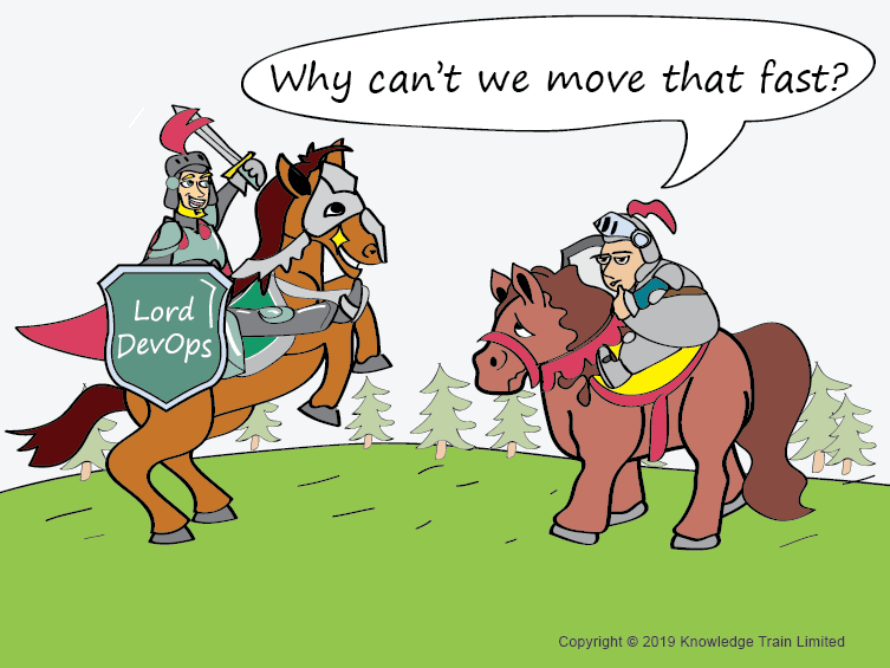
If you’re wondering why you should move into a DevOps career, here are three statistics that might help you decide:
We all know how fast technology is moving right now. Traditional software development methods just haven’t been able to keep up. Instead, agile methods such as DevOps are considered the way forward.
To survive in this fast-moving world, more companies are adopting DevOps. Working in a DevOps culture enables teams to deliver quality software quickly. As a result, customer satisfaction is higher and satisfied customers means more profit. Because more companies are starting to realise these benefits, demand for DevOps skills is increasing. It’s that simple.
What type of company uses DevOps?
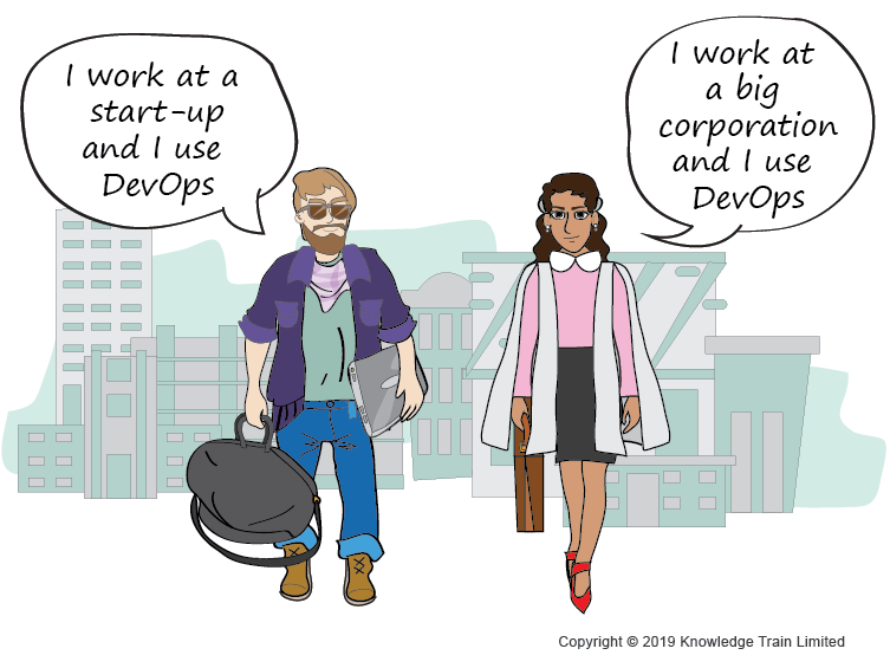
DevOps is a cutting-edge way of developing software or IT solutions quickly. It is used by IT departments within large companies, by small tech start-ups or in the public sector. Because DevOps is a set of modern practices, it makes sense to see modern companies or teams creating modern technology using it. Amazon, Netflix, Facebook, Etsy, Adobe and Sony all use DevOps[4]. Outside of the tech realm, Capital One, Hertz, Westpac and American Airlines have used DevOps successfully too[5].
As the benefits of adopting DevOps become more widely known, you will find more and more organisations demanding their IT staff possess DevOps skills and knowledge.
What type of DevOps jobs are available?
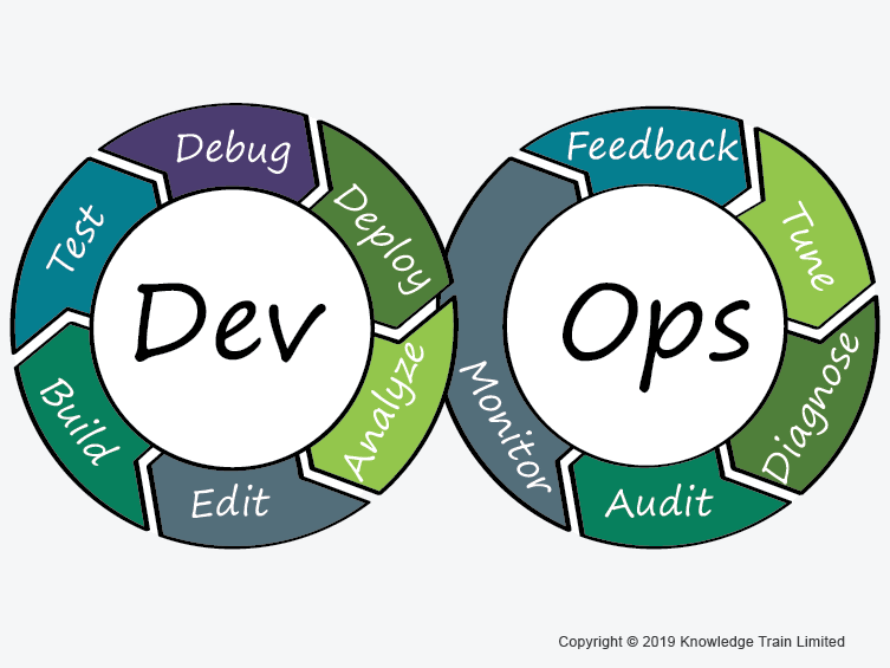
As DevOps combines software development and IT operations, DevOps job titles will relate to these two parts. When searching for DevOps jobs, you’ll find many DevOps organisations advertising for traditional analyst, developer and engineer roles. The difference is that DevOps developers will be expected to have operations knowledge and vice versa.
Some DevOps organisations, however, are starting to hire roles specific to DevOps. This is likely because DevOps is increasing in popularity and so the roles are becoming more defined. You will therefore find DevOps jobs such as DevOps Engineer and Automation Architect cropping up in job searches more and more.
DevOps jobs can be categorised into development, operations, quality assurance, security and senior level roles. Here are some of the DevOps jobs you will come across:
DevOps Engineer
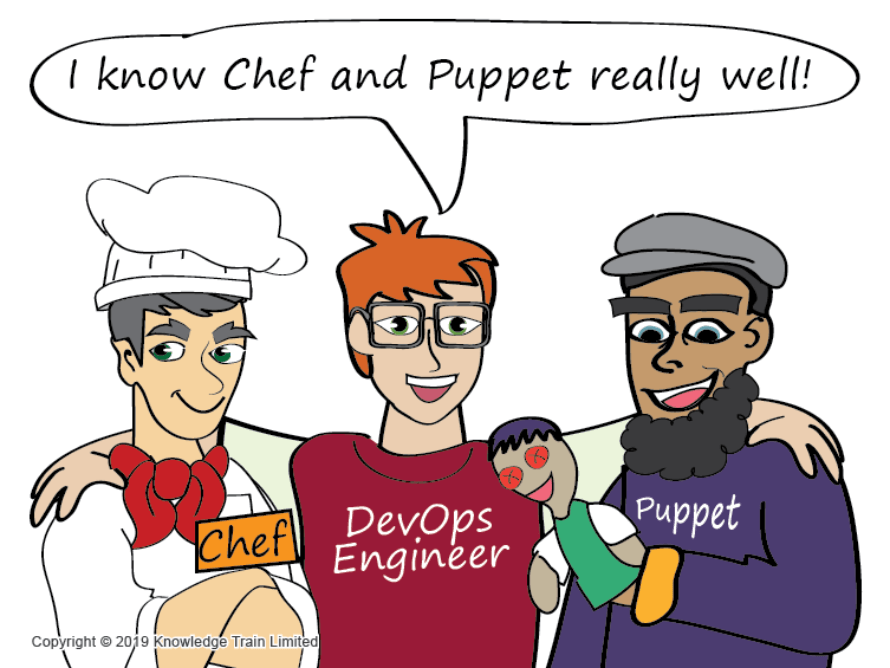
In 2017, DevOps Engineer was the most commonly reported DevOps job title in Western Europe[6].
Without a DevOps Engineer, a DevOps project cannot happen. The DevOps Engineer puts the ‘Dev’ in DevOps and is a crucial part of any DevOps team. Just like a traditional software developer, the DevOps Engineer will design and code software according to requirements. However, as they work alongside the operations team, the DevOps Engineer also needs knowledge of testing, support and monitoring.
They will also be involved in deploying new modules and upgrades using automated systems. Because they are a key team member, the DevOps Engineer will also be heavily involved in project planning, offering technical expertise and providing development forecasts/plans.
Average salary: £60,000 per year[7]
Skills: The DevOps Engineer must be adept at writing code and using automation tools such as Puppet or Chef. They will need to understand the Python, Ruby or Perl programming languages – often all three. Anyone wanting to be a DevOps Engineer will also need to be a strong communicator and team player, with a strong understanding of DevOps practices and current technology trends.
Experience: You need hands-on experience for this role. A DevOps Engineer often starts off as a standard developer interested in deployment and network operations, or as a system admin keen on coding[8]. If you aren’t currently working in the IT industry, but fancy being a DevOps Engineer, try becoming a software developer first. The traditional route is to gain a computing degree and apply for jobs or graduate schemes. These days, however, you can attend an intensive coding ‘boot camp’ course and learn to code in a matter of weeks. General Assembly, Maker’s Academy and Le Wagon are just some of the providers offering such courses.
Many people also become developers through apprenticeships and post-graduate conversion courses[9]. Opportunities are also increasing for skilled and passionate code writers with no formal qualifications[10].
Qualifications: If you are already working in the IT industry, you can increase your knowledge with a DevOps qualification from the DevOps Institute. This is the best way to gain DevOps skills and prove to employers you understand the DevOps philosophy. The qualification to start with is DevOps Foundation®. This gives you a solid overview of DevOps and allows you to take further qualifications.
Operations roles
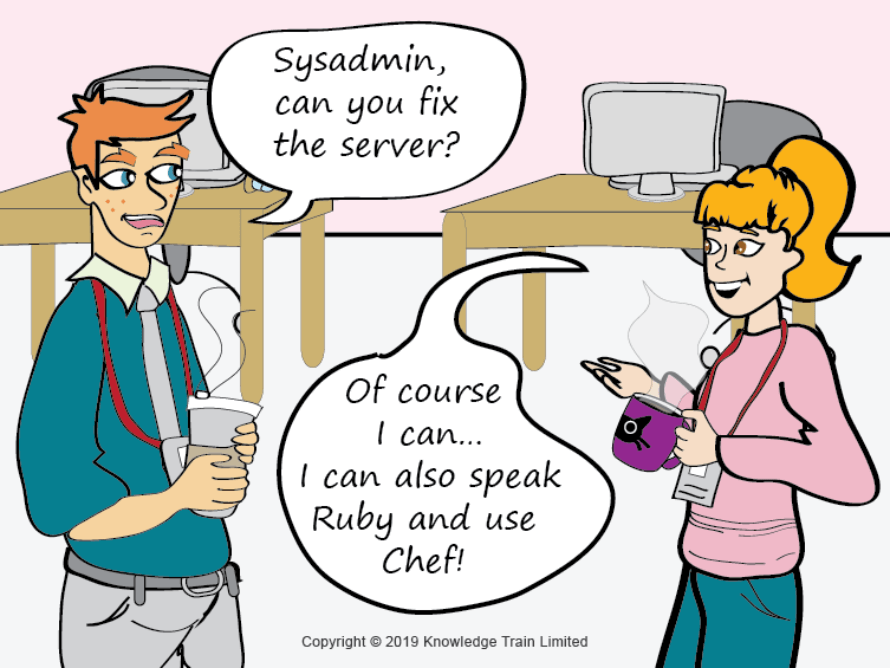
Although many IT professionals predict DevOps will eventually remove the need for operations, the reality is that DevOps teams need operations staff. Operations put the ‘Ops’ in DevOps and carry out deployments, manage servers, provide support, diagnose issues, monitor systems and gather feedback. Once the DevOps Engineer has built the product, operations will take care of the rest.
DevOps operations are often called system administrators (sysadmin) or DevOps administrator. They perform standard sysadmin tasks – preventing problems, improving system performance and keeping the company’s network running efficiently[11]. However, what sets them apart is their knowledge of code and automation tools, which is required as they work alongside the DevOps Engineer.
Average salary: £50,000 per year[12]
Skills: Working alongside DevOps Engineers means operations staff will need to understand programming languages such as Ruby, Perl and Python. They need to understand this code so that they can provide accurate support. An understanding of automation software, such as Puppet and Chef, is also essential. This is because deployment tasks in DevOps are automated.
Like the DevOps Engineer, anyone wanting to work in DevOps operations will need to be a good team player and communicator. As they provide support and fix issues, a problem-solving mindset is beneficial. Like the DevOps Engineer, DevOps operations will also need a solid understanding of DevOps principles.
Experience: Those with experience in system administration, IT support and IT engineering (such as network or platform engineers) can all gain employment in DevOps operations. Many people enter these roles by gaining a relevant degree, however, there are now apprenticeships and internships available for many IT roles, which provide training and hand-on experience.
Qualifications: An understanding of DevOps practices can be gained with DevOps Foundation certification. After gaining this, you may want to take further qualifications, such as DevOps Test Engineering (DTE)®. As this is also an IT support role, ITIL qualifications are also highly recommended. Check out the ITIL® Foundation course as a starting point. You might also want to gain industry standard certification in Cisco, Linux or Microsoft.
Security Engineer
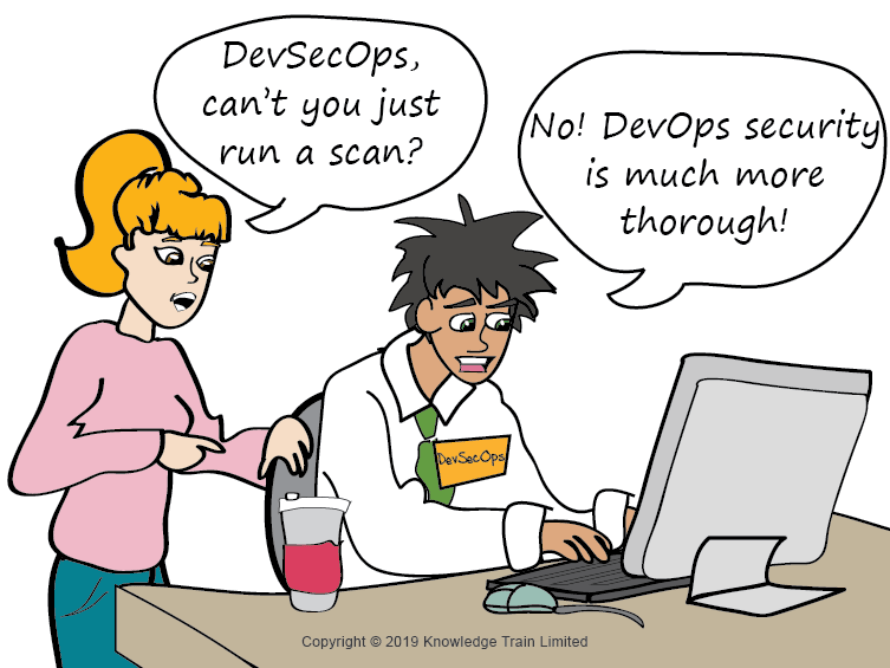
DevOps asserts that security should be built into software from the start of development. It shouldn’t be an afterthought, like it is with traditional approaches to security. Therefore, Security Engineers working in DevOps teams will work side-by-side with DevOps Engineers during the development stage[13].
This DevOps approach to security is often called DevSecOps. Working within a culture of high collaboration and communication, DevOps Security Engineers use threat modelling, risk assessments and automation of security tasks[14] to address security. They strive to operate like DevOps Engineers, using an iterative approach and attacking the software to discover vulnerabilities before they can happen, as opposed to relying upon scans afterwards[15].
Average salary: £40,000 – £50,000 per year[16]
Skills: To be a DevOps Security Engineer, you must be an excellent team player and good communicator, as you will be collaborating with everyone on the team. Because this is a DevOps job, it will certainly be worth your while to learn automation software and languages such as Ruby, Perl or Python. A good understanding of DevOps principles is also highly beneficial, as is up-to-date knowledge of cyber security trends and current best practice.
Experience: You will need practical experience, and many DevOps Security Engineers will start off as security professionals working in a non-DevOps role. If you are not yet working in IT security, the traditional route of gaining a degree in something like computer science, cyber security, mathematics, engineering or science[17] is effective. Entering without a degree is also possible by gaining industry standard qualifications, such as those offered by Microsoft, Cisco, CompTIA or the Certified Ethical Hacker (CEH) certification.
Qualifications: Gaining the DevOps Foundation qualification will equip you with knowledge of DevOps and boost your CV. After gaining this certificate, you can progress onto the DevSecOps Engineering (DSOE)℠ qualification, which is also accredited by the DevOps Institute. This will give you an understanding of security on DevOps projects, which is very different to standard IT security.
Automation Architect
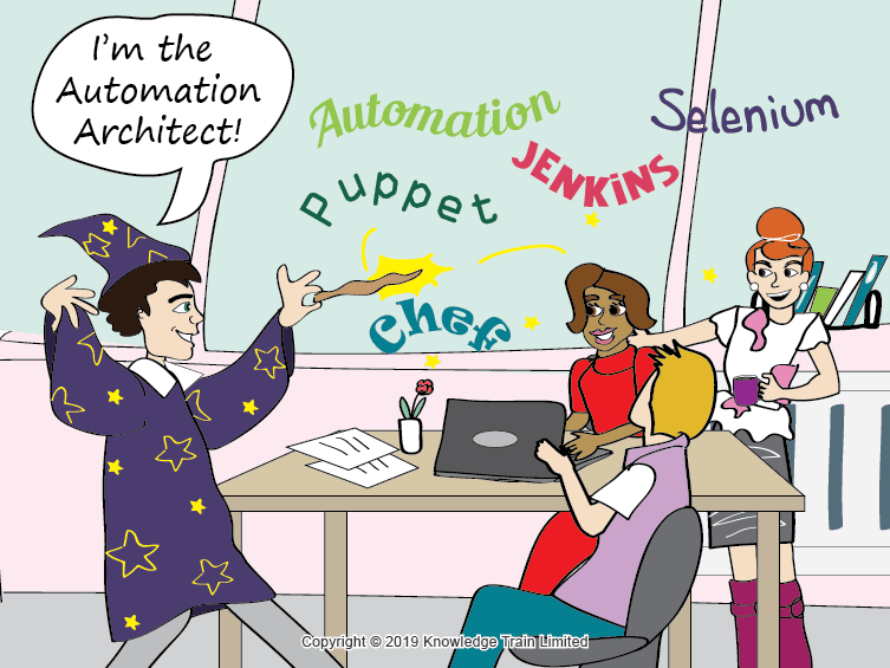
This is a vital DevOps job, simply because DevOps relies on automated systems. Automation Architects will analyse, design and implement strategies to enable continuous deployment[18]. They create a technical environment which enables DevOps teams to deliver faster and more effectively.
The Automation Architect will help the business and DevOps team decide which automation tools to use, how best to implement such tools and who will maintain the tools[19]. They will develop automation plans that take senior management, the DevOps team and the wider business into consideration. They might also be called an Automation Expert or Automation Engineer.
Average salary: £97,500 per year[20]
Skills: You will need to be an expert regarding automation software, understanding which tool is best to use in any given situation. Ensure you have a working knowledge of Chef, Puppet, Jenkins and as many other automation tools as possible. Again, knowledge of Python, Ruby and Perl is also an advantage. You’ll also have the confidence and communication skills to put forward opinions to DevOps teams and top-level management.
Experience: This is a high-level DevOps job requiring lots of experience using DevOps and automation tools. You’ll normally require 3-5 years of experience in software development, or as a software engineer/architect[21]. The most straightforward route into this role would be to gain experience in a DevOps Engineer or DevOps operations role first.
Qualifications: Gaining a DevOps Foundation qualification will enable you to progress onto the Continuous Delivery Architecture (CDA)® qualification, also accredited by DevOps Institute. This will teach you how to design a continuous delivery strategy. Both qualifications prove to employers you understand DevOps and how to design a successful strategy. As you are planning strategies for an entire team, ITIL knowledge would also be beneficial. Consider an ITIL qualification to boost your CV.
Product Owner
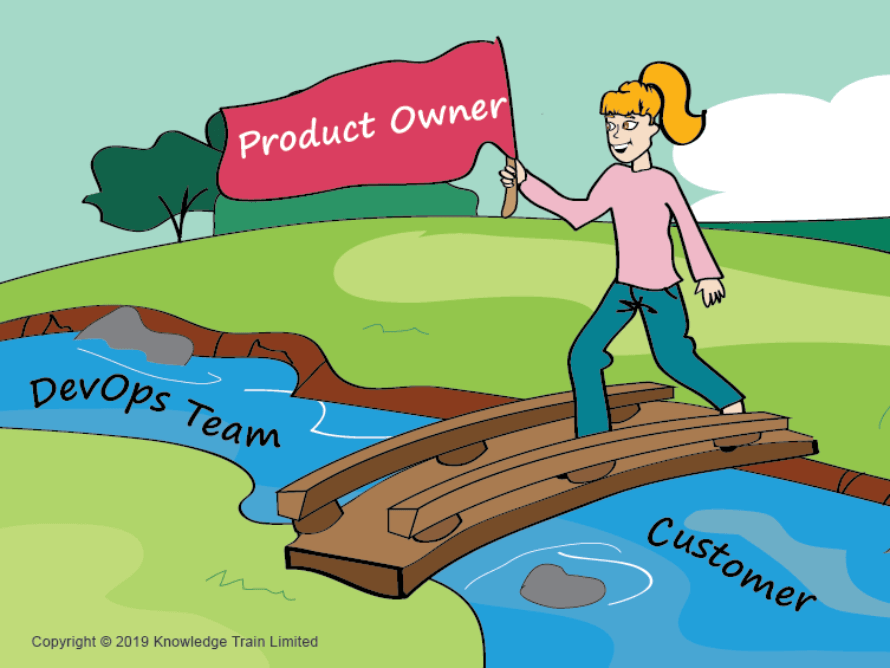
The Product Owner (sometimes called Product Manager) bridges the gap between the DevOps team and the customer. They understand the technical capabilities of the DevOps team and the requirements of the customer[22]. They are also responsible for planning and prioritizing the workload for each iteration. The Product Owner role can also be summed up as an ‘onsite salesperson’ – they can speak passionately about the product, they have a vision and know their market[23].
Average salary: Start on £25,000 – £40,000 per year[24]
Skills: As you’ll be transmitting customer needs to the DevOps team, and simplifying ‘tech-speak’ for the customer, you will need excellent communication skills. You will also be dealing with important stakeholders, so will need a confident and professional approach.
As this role is based in the software industry, you will also need a strong understanding of how this technology works and whether the DevOps team are able to create what the customer wants. The Product Owner is also a sales/marketing role, so you will need to be comfortable performing analysis on target markets, the product’s market and competitors[25].
Experience: You will need experience to get into this role. You might have previously worked in other DevOps roles (development or operations), and are choosing to move into the business side of things. There are no formal qualifications or degree routes into the role, but you might consider gaining a qualification from the Chartered Institute of Marketing (CIM) to help boost your marketing skills.
Qualifications: To ensure you understand how the DevOps team operate, you will need knowledge of DevOps. This can be gained with a DevOps Foundation qualification. As you will be planning the workload, knowledge of Kanban may also be beneficial.
Head of DevOps
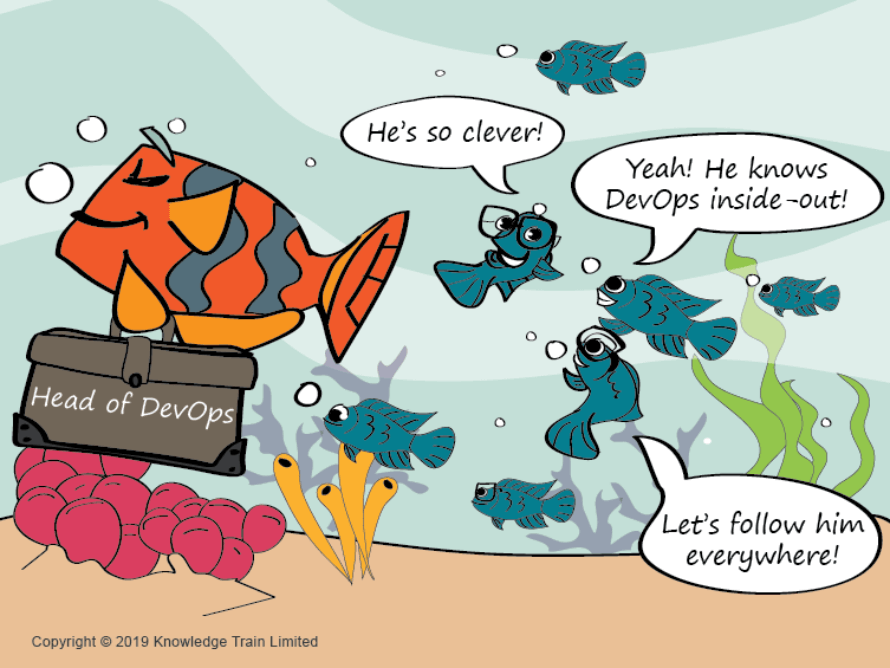
This person is the leader. They will have a passion for DevOps, understanding how it works and the benefits for the organisation. They’ll ensure DevOps is being implemented properly and that the team is properly trained. It is perhaps the most vital DevOps job, as DevOps is all about culture change and this person knows how to change that culture[26].
As DevOps rises in popularity, so will the demand for DevOps experts who can lead a team and implement DevOps effectively. Typing ‘Head of DevOps’ into a jobs website will bring up lots of results, so the role is now being defined. However, this role also falls to the most senior DevOps Engineer on the project, or consultants hired from outside the company for their DevOps expertise.
They are also known as the DevOps Evangelist, Senior DevOps Engineer or DevOps Consultant.
Average salary: £100,000 per year[27]
Skills: You will need to be a confident leader with DevOps skills. You will understand how DevOps works and the benefits it can bring organisations. You will be patient and a clear communicator, happy to train teams on DevOps best practice.
Experience: You will need a great deal of experience implementing DevOps, as well as with mentoring or coaching a team to use DevOps practices. Head of DevOps is often the next step for an experienced DevOps Engineer who has worked extensively with DevOps and coached their team mates.
Qualifications: A DevOps Foundation qualification will formalise your knowledge and prepare you for higher DevOps certificates, such as the DevOps Leader (DOL)® qualification. This qualification is ideal for anyone responsible for implementing DevOps and driving the cultural change. These certificates are particularly useful for consultants, who need to prove their knowledge to potential clients. For maximum impact, combine them with a CV that details the companies you’ve helped transition to DevOps.
Summary
Overall, as DevOps begins to rise, so will the demand for people with DevOps knowledge and technical skills.
In the UK right now, demand for DevOps, Python and Ruby skills are considerably outstripping supply[28]. We have a skills shortage, so education and awareness must increase. If you currently work in the IT industry or are considering starting an IT career, now is the time to upskill to DevOps and its related tools.
Look to the future and ensure you don’t get left behind.
List of references
[1] Aliza Earnshaw. (2013). What Is a DevOps Engineer? Available: https://puppet.com/blog/what-a-devops-engineer. Last accessed 30th January 2018.
[2] Kim Weins. (2016). New DevOps Trends: 2016 State of the Cloud Survey. Available: https://www.rightscale.com/blog/cloud-industry-insights/new-devops-trends-2016-state-cloud-survey. Last accessed 31st January 2018.
[3] Robert Stroud. (2017). 2018: The year of enterprise DevOps. Available: https://go.forrester.com/blogs/2018-the-year-of-enterprise-devops/ Last accessed: 7th February 2018.
[4] Christopher Null. (Unknown). 10 companies killing it at DevOps. Available: https://techbeacon.com/10-companies-killing-it-devops. Last accessed 30th January 2018.
[5] Yanev Yehuda. (2017). Fortune 500 Companies Embrace DevOps – Four Success Stories. Available: https://channels.theinnovationenterprise.com/articles/fortune-500-companies-embrace-devops-four-success-stories. Last accessed 30th January 2018.
[6] Puppet. (2017). 2017 DevOps Salary Report. Available: file:///C:/Users/stephr/Downloads/puppet-2017-devops-salary-report%20(1).pdf. Last accessed 31st January 2018.
[7] IT Jobs Watch. (2018). Development Operations Engineer UK. Available: https://www.itjobswatch.co.uk/jobs/uk/devops%20engineer.do. Last accessed 31st January 2018.
[8] Aliza Earnshaw. (2013). What Is a DevOps Engineer? Available: https://puppet.com/blog/what-a-devops-engineer. Last accessed 31st January 2018.
[9] Unknown. (2017). Software Developer Job Profile. Available: https://nationalcareersservice.direct.gov.uk/job-profiles/software-developer. Last accessed 2nd February 2018.
[10] James Burt. (2014). How to become a software developer without a degree. Available: https://www.theguardian.com/careers/careers-blog/how-to-become-a-software-developer Last accessed: 7th February 2018.
[11] Computer Weekly. (2013). How to become a system administrator. Available: http://www.computerweekly.com/photostory/2240205822/How-to-become-a-system-administrator/1/System-administrator-Job-description. Last accessed: 6th February 2018.
[12] IT Jobs Watch. (2018). DevOps Administrator UK. Available: https://www.itjobswatch.co.uk/jobs/uk/devops%20administrator.do Last accessed: 6th February 2018.
[13] Stephanie Overby. (2018). 7 DevOps roles you need to succeed. Available: https://techbeacon.com/7-devops-roles-you-need-succeed. Last accessed: 7th February 2018.
[14] Scott Matteson. (2017). DevSecOps: What it is and how it can help you innovate in cyber security. Available: http://www.zdnet.com/article/devsecops-what-it-is-and-how-it-can-help-you-innovate-in-cybersecurity/ Last accessed: 7th February 2018.
[15] DevSecOps.org. (Unknown). DevSecOps Manifesto. Available: http://www.devsecops.org/ Last accessed: 7th February 2018.
[16] Scott Carey. (2017). How to get a job as a security engineer: skills, qualifications, responsibilities and salary expectations Available: https://www.computerworlduk.com/careers/how-get-job-as-security-engineer-3645388/ Last accessed: 7th February 2018.
[17] Scott Carey. (2017). How to get a job as a security engineer: skills, qualifications, responsibilities and salary expectations Available: https://www.computerworlduk.com/careers/how-get-job-as-security-engineer-3645388/ Last accessed: 7th February 2018.
[18] Stephanie Overby. (2018). 7 DevOps roles you need to succeed. Available: https://techbeacon.com/7-devops-roles-you-need-succeed. Last accessed: 7th February 2018.
[19] Susan Moore. (2017). Introducing the Automation Architect. Accessed: https://www.gartner.com/smarterwithgartner/introducing-the-automation-architect/ Last accessed: 7th February 2018.
[20] IT Jobs Watch. (2018). Automation Architect. Available: https://www.itjobswatch.co.uk/jobs/uk/automation%20architect.do Last accessed: 7th February 2018.
[21] Jeffrey Lee. (2017). Does your organisation need a DevOps architect? Available: https://hackernoon.com/does-your-organization-need-a-devops-architect-75315143a641?gi=9021c49484cc Last accessed: 8th February 2018.
[22] Medium. (2016). Roles and Responsibilities for DevOps and Agile Teams. Available: https://medium.com/@cote/roles-and-responsibilities-for-devops-and-agile-teams-fdacbffb4cb4 Last accessed: 7th February 2018.
[23] Nic Ferrier. (Unknown). DevOps – the Product Owner. Available: http://nic.ferrier.me.uk/blog/2013_05/the-product-owner Last accessed: 7th February 2018.
[24] Prospects. (Unknown). Product Manager. Available: https://www.prospects.ac.uk/job-profiles/product-manager Last accessed: 7th February 2018.
[25] Prospects. (Unknown). Product Manager. Available: https://www.prospects.ac.uk/job-profiles/product-manager Last accessed: 7th February 2018.
[26] Stephanie Overby. (2018). 7 DevOps roles you need to succeed. Available: https://techbeacon.com/7-devops-roles-you-need-succeed. Last accessed: 7th February 2018
[27] IT Jobs Watch. (2018). Head of DevOps UK. Available: https://www.itjobswatch.co.uk/jobs/uk/head%20of%20devops.do Last accessed: 5th February 2018.
[28] Hired. (2018). The UK: Building Tomorrow’s Digital Powerhouse. Available: https://hired.com/skills-gap Last accessed: 7th February 2018.








